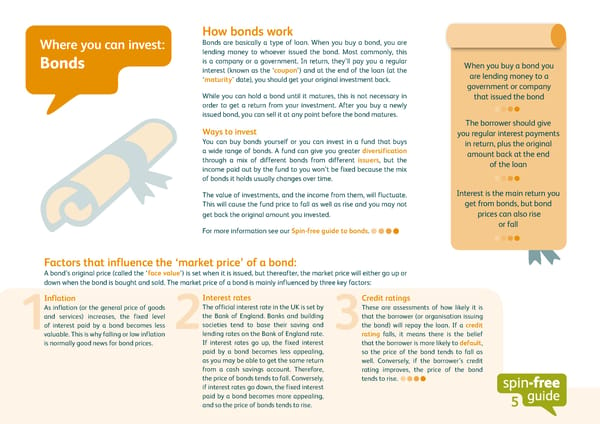How bonds work Where you can invest: Bonds are basically a type of loan. When you buy a bond, you are lending money to whoever issued the bond. Most commonly, this Bonds is a company or a government. In return, they’ll pay you a regular When you buy a bond you interest (known as the ‘coupon’) and at the end of the loan (at the are lending money to a ‘maturity’ date), you should get your original investment back. government or company While you can hold a bond until it matures, this is not necessary in that issued the bond order to get a return from your investment. After you buy a newly issued bond, you can sell it at any point before the bond matures. The borrower should give Ways to invest you regular interest payments You can buy bonds yourself or you can invest in a fund that buys in return, plus the original a wide range of bonds. A fund can give you greater diversification amount back at the end through a mix of different bonds from different issuers, but the of the loan income paid out by the fund to you won’t be fixed because the mix of bonds it holds usually changes over time. The value of investments, and the income from them, will fluctuate. Interest is the main return you This will cause the fund price to fall as well as rise and you may not get from bonds, but bond get back the original amount you invested. prices can also rise or fall For more information see our Spin-free guide to bonds. Factors that influence the ‘market price’ of a bond: A bond’s original price (called the ‘face value’) is set when it is issued, but thereafter, the market price will either go up or down when the bond is bought and sold. The market price of a bond is mainly influenced by three key factors: Inflation Interest rates Credit ratings As inflation (or the general price of goods The official interest rate in the UK is set by These are assessments of how likely it is and services) increases, the fixed level the Bank of England. Banks and building that the borrower (or organisation issuing of interest paid by a bond becomes less 2societies tend to base their saving and 3the bond) will repay the loan. If a credit 1 valuable. This is why falling or low inflation lending rates on the Bank of England rate. rating falls, it means there is the belief is normally good news for bond prices. If interest rates go up, the fixed interest that the borrower is more likely to default, paid by a bond becomes less appealing, so the price of the bond tends to fall as as you may be able to get the same return well. Conversely, if the borrower’s credit from a cash savings account. Therefore, rating improves, the price of the bond the price of bonds tends to fall. Conversely, tends to rise. if interest rates go down, the fixed interest paid by a bond becomes more appealing, and so the price of bonds tends to rise. 5
 Guide to Investing Page 4 Page 6
Guide to Investing Page 4 Page 6